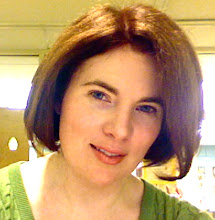Why Do People Shy Away from Books About Autism?
 It's a good question to ask because I've done it. Marcelo in the Real World by Francisco X. Stork had been on my reading list for most of the school year but I kept putting it off - surely there was another vampire book, werewolf-zombie love triangle book, book about talking grasshoppers, etc. I should be reading rather than a book that sounded like a tough sell to my kids? We have students that land on the autism spectrum in our school and they are wonderful, unique students, so why do I hesitate to read about them?
It's a good question to ask because I've done it. Marcelo in the Real World by Francisco X. Stork had been on my reading list for most of the school year but I kept putting it off - surely there was another vampire book, werewolf-zombie love triangle book, book about talking grasshoppers, etc. I should be reading rather than a book that sounded like a tough sell to my kids? We have students that land on the autism spectrum in our school and they are wonderful, unique students, so why do I hesitate to read about them? My best guess is that I know that these kids live in a hard world, one that was not designed to understand them or play to their strengths, and since I notice I tend to avoid books about other hard subjects, I'm going to chalk my hesitancy to the same impulse that sends me out of the room to get a glass of water or vacuum the bedroom when something tense or sad is happening on the Law & Order episode I'm watching. I'm not proud of it, but there you go.
I'm an idiot for putting off Marcelo in the Real World, however, because it's one of the best books I've read all year.
Marcelo Sandoval hears music no one else can hear--part of the autism-like impairment no doctor has been able to identify--and he's always attended a special school where his differences have been protected. But the summer after his junior year, his father demands that Marcelo work in his law firm's mailroom in order to experience "the real world." There Marcelo meets Jasmine, his beautiful and surprising coworker, and Wendell, the son of another partner in the firm. He learns about competition and jealousy, anger and desire. But it's a picture he finds in a file -- a picture of a girl with half a face -- that truly connects him with the real world: its suffering, its injustice, and what he can do to fight. Reminiscent of "The Curious Incident of the Dog in the Night-Time" in the intensity and purity of its voice, this extraordinary novel is a love story, a legal drama, and a celebration of the music each of us hears inside. (from Scholastic's website)
 I suppose you can't get around the comparison to The Curious Incident of the Dog in the Night-Time
I suppose you can't get around the comparison to The Curious Incident of the Dog in the Night-TimeAnother surprise for me was the religion theme in this book. While modern young adult literature often wrestles with ethics, and therefore moral codes explicit or not, many authors seem to shy away from more in depth discussions of religion in the lives of their protagonists unless it is vital to his or her identity or the plot. Marcelo has religion as his "special interest", the term he uses to describe the intense focus on a particular topic sometimes experienced by people on the autism spectrum. His mother wisely introduced him early on to a wonderful female rabbi who has become one of Marcelo's close friends and who helps him deal with some of the cruel realities Marcelo faces as his father places him in the "real world". The sweetness of the deepening friendship between Marcelo and Jasmine and the potential it possesses to become something more is a valuable romantic perspective. When so many recent YA novels have been about obsessive, passionate, all-consuming love, it is nice to remember that sometimes love is gentle and just sneaks up on you. This novel does a lovely job showing how that kind of love can be just as enthralling as the "jump off a cliff if I can't be with you" variety.
From the standpoint of a librarian, we have got to stay on top of the wave of information about autism, not only for the students in our lives dealing with this issue but also because so many of our non-autistic students have family members also coping with this issue. Add to that our commitment to librarians to all types of diversity and our obligation becomes an imperative. A recent School Library Journal article offers a host of information and good links and can be an excellent starting point for educating ourselves. Love the Marcelo in the Real World, too, but uncertain of how to promote it? Scholastic Books had renowned booktalker, Joni Bodart, write out a booktalking script for the novel that would be a great starting point. Author Francisco X. Stork's website has great discussion questions for getting a book group rolling on these topics and themes, and a great author interview can be found at teenreads.com (a website which never disappoints to encourage recreational reading).

































